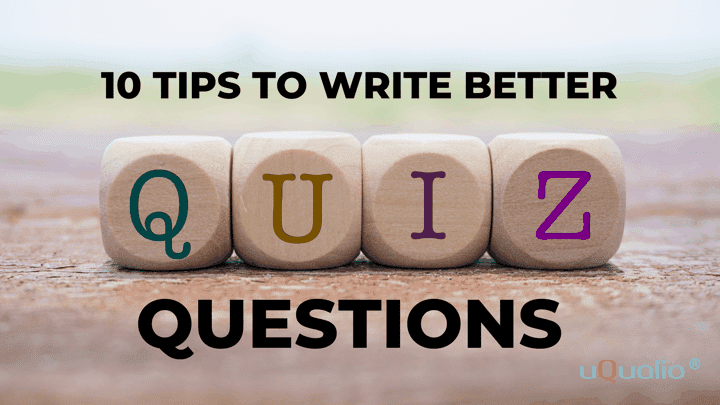Writing a quiz for repeating newly gained knowledge in eLearning , especially if you’re a novice, can seem like a daunting task. There’s the comprehensive research behind it, but then there’s also the art of asking the right questions. If you’re worried about your next quiz, then help is on its way.
Here are 10 valuable TIPS for your next quiz writing adventure.
1. Simplify, simplify. No room for ambiguity.
Avoid phrasing questions that leave room for more than one correct answer. For example, avoid the phrasing:
- Why did JFK believe it was politically necessary to go to the moon?
During the cold war, the Soviets and the US were involved in an arms race. More than that, they were also involved in a competitive “who can get there first” space adventure.
This birthed many ambitious political programs such as the pressure on NASA to figure out how to conduct the very first manned exploration of the lunar surface.
But that’s notwhat the first question entails. It invites analysis on both sides of the spectrum which is notthe purpose of a quiz. Instead, ask the following:
- Why did JFK believe it was necessary to put pressure on NASA to conduct the very first manned lunar exploration?
Here we invite the notion, the answer, that it was necessary for the US to display superiority in a cold war era exactly by “getting there first”.
2. Write ageless
A timeless mantra is this: tests age poorly. So there’s no reason to rush their aging. Well, maybe it’s not a popular mantra but it is indeed a respectable method. Avoid slang or humor or cultural references unless it is relevant to the answer. That way all branches of the age can relate to the test and understand the questions.
3. Concise
Keep everything short and concise. This blog post might violate that very advice but, in a quiz, answers must be short, concise, and very easy to comprehend.
4. Avoid multiple question answers
Avoid “all the above” or “none the above” drivel. It leads to unnecessary confusion. Quizzes are about black and white, right and wrong. Stick to one correct answer.
5. Double negatives
Avoid the dreaded double negative. A question that features a negative such as, “Which of the following is NOT a…” leads to confusion since the reader is forced to read the question more than one time. And it can also suggest the wrong answer if written poorly.
6. Only ask questions to curriculum
All of your questions have to be covered by the curriculum you’ve presented in class. It’s an unfair practice to sneak in a question that’s not covered by the curriculum. It’s not the purpose of a quiz. But remember to add questions related to your additional resource material like pdf’s and PowerPoints – that is fair
7. Key messages should be covered in the quiz questions
Provide questions that reflect the objective of the course/class.
8. Find the right level
Don’t attempt to fail your learners with an overly difficult question. The purpose is to repeat the curriculum so that it sticks to memory and to provide the learners with a sense of accomplishment. Don’t make the quiz too easy, either. It’s a matter of balance.
9. Short Questions
If a question leads to an analysis of some sort, make the question short & concise as to provide ample time to write the analysis.
10. Ensure key learning are repeated in the questions
Keep your eyes on the prize: what is the direct purpose of this quiz. Gather and compose your questions in the pursuit of that very goal … the sought-after prize. A united course is a fruitful course. And the repetition makes the curriculum stick – and that is the best way to beat the forgetting curve!
Enjoy!

Achieve Effective & Affordable Video Training
– uQualio is an award-winning, easy-to-use, all-in-one NextGen LMS software for any types of online video training.












